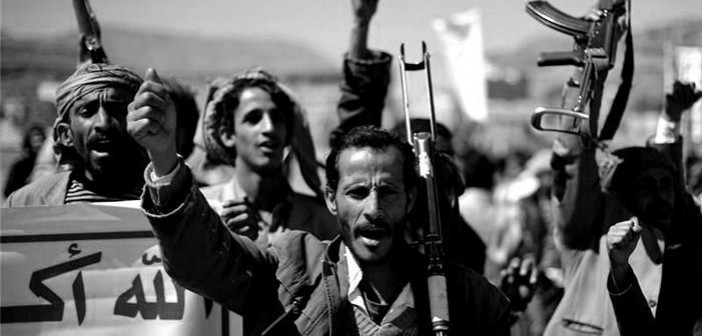The Houthis’ entry to the capital San’a on 21st September 2014 has marked a significant change in the Yemeni political landscape. The radical Zaidi militants not only are officially recognized as a key player, but they have already proved to be game changers -thanks to the UN-brokered deal termed “Peace and National Partnership Agreement (PNPA)” and US counter-terrorism policy. The first served as a recipe of coup d’État, the latter helped to put it into place.
The Houthis’ multi-phases coup was deftly designed to be carried out gradually. The first phase was achieved successfully on September 21; emboldening the militants group to go on with their scheme confidently.
Four months later, on January 20, 2015 President Abdedrabo Mansour Hadi, Prime Minister Khalid Bahah and several ministers were under house arrest. One more gambit was devised as a compromise under which the president ought to immediately issue republican decrees appointing Houthis in the key leadership positions including vice president, vice ministers and dozens as high rank officials in the military and security institutions as well as civil service. Hadi eventually made the right decision rendered his resignation. By doing so, he really scored a golden goal in the injury time, spoiling Houthis’ uncalculated venture.
Who are Houthis?
Houthis are simply described as Shiite or Zaidi rebels from the northern part of Yemen. They get their name from the founder of the group, Hussein Bader Al-Dean Al-Houthi. A radical Zaidi leader who held deep faith and conviction that a Fatimid leader is a pre-requisite to lead the nation righteously.
Hussein Al-Houthi quit his seat in the parliament in the 1990s. He was one of only few representatives of Al-Haq Party. A political party established by the Hashemite politicians. Then, he went on communicating with the Hashemite community which is estimated at approximately 7% of Yemen’s total population. He could easily recruit many of the Hashemite fellows.
Within few years, the Sa’ad based- Zaidie organization could make significant progress, securing financial resources, recruiting large numbers of Hashemites and Zaidi fellows and possessing weapons. The Zaidi doctrine glorifies martyrdom and promotes Jihad culture. Under the Zaidism, political authority should be in the hands of a prophetic figure, mainly one of the grandsons of the prophet’s daughter, Fatima. Anyone of Fatimid family assumes himself qualified to lead and should declare Jihad against an oppressive ruler. This is the pre-requisite for a legitimate Fatimid Imam. Hence, the Houthi movement opted for armed struggle and took arms against the state.
In 2004, after several clashes with Hussein Al-Houthis militants in Sa’ada, the government launched large military operation resulted in killing Hussein Al-Houthi, putting down the rebellion temporarily.
Later on, Abdulamallk Al-Houthi, Hussein’s brother replaced him as a leader of the movement.
Houthis have been basically perceived by many Yemenis — mainly their opponents — as Hashemite power-seekers fighting to regain political authority. The former president Ali Saleh, their old foe, currently ally, labeled Houthis as “radical Shiites preaching the Twelvers doctrine”. He also repeatedly accused the movement of fighting to reincarnate the Imamate theocracy.
Mohammed Al-Yazili, a veteran Yemeni politician and media personality who contributed to the 26 Revolution in 1962 against the Imamate regime, described the Houthi movement as “reactionary”.
Dr Abdulkarem Al-Iryani, former prime minister who played a key role in shaping Yemen’s politics over the past three decades, criticized the Houthis’ arrogance and their resolve to forcefully impose their own will upon all Yemeni political forces. “No Yemeni has a privilege over another Yemeni, except the one who better served Yemen“. Dr Al-Iryani told the press in an interview. He blamed the Houthis for contributing towards ruining the state institutions.
Houthis takeover alarming
Yemenis, except the Hashemite segment, are very anxious about the Houthi takeover. It is a nightmare for the vast majority of Yemeni people. They have had a very bad experience with Imamate theocratic ruling.
Looking back to Yemen’s history, Hashemite Imams had contributed largely to Yemen’s instability and disunity. They had played a divisive religious role and segregated Yemenis into two sects: Zaidi and Sunni. They promoted discriminative social culture and caused serious damage to the Yemeni society social coherence.
Politically, Imamate theocratic system had been as discriminative as the apartheid in South Africa. The Ingenious Yemenis—non Hashemite—had been totally excluded from political power. Moreover, the Sunnis were not allowed to join the military.
Moroccans in the 21st century have continued to kiss the hands of the Hashemite king as they shake hands with His Majesty. Meanwhile, native Yemenis had used to bend over and kiss not only the Imam’s knees, but also of every Hashemite official, judge, clergy or social dignitary to prove loyalty and submissiveness.
“Knees-kissing ages have gone”, the Houthis’ staunched opponents, in reference to the Imamates ages, have frequently cited this phrase.
True, Houthis have been very keen to show their commitment to the republican system. However, they have failed so far to renounce the Fatimid self-claimed right to rule. Here is the problem of the militant organization. If they openly defend this controversial claim, they will seriously alienate themselves, provoke many Yemenis including Zaidis. In case that they dare to pronounce clearly that every Yemeni citizen has the right to exercise political power without any discrimination, they will antagonize the Hashemite community and jeopardize the movement’s unity and identity.
Why the Houthis swiftly gained grounds?
First, there was local, regional and international complicity. Obviously, Houthis were given the green light to take on the arch-rivals of Sunnis, mainly the Muslim Brotherhood, Wahhabi- Salfis, and Al-Qaeda local branch, known as AQAP. They were allowed to eliminate the Dammaj well-established Salfi Institute in Sa’ada governorate, where thousands of Yemenis, hundreds of Arabs and dozens of foreigners were radicalized.
They also attacked Al-Iman University in the capital Sana’a, allegedly designed to promote radicalism. The facility established and chaired by the controversial religious scholar Sheikh Abdulmajeed Al-Zindani, Jihadist preacher and leading figure of the Muslim brotherhoods in Yemen, who has been wanted by the USA for his alleged relations with Al-Qaeda.
Moreover, they targeted the key supporters of Al-Islah Party, a wide-range religious oriented grouping, which comprises Muslim Brotherhoods, Wahabis and tribesmen. They attacked the family of Sheikh Al-Ahmer, the most influential tribal player in Yemen’s politics over the past 50 years.
They have also confronted and neutralized General Ali Mohssin Al-Ahmer, the most influential military commander in the Yemeni military over the past three decades who used to serve as the leader of the military wing of Muslim Brotherhoods; he has established strong links with the extremist and terrorist groups including Al-Qaeda.
Apparently, the radical Zaydi group has been employed by the US, EU and their regional allies to fight the bad guys as the old theory goes “Let bad guys kill each other”. They have already been doing so. Friday’s terrorist attacks against worshipers in Sana’a, is an example of it. The Houthi takeover has created the ideal recruitment climate for Al-Qaeda, which now portrays itself as the defender of the Sunnis against the Shiites. Many Yemenis have now started to demonstrate sympathy with Al-Qaeda and aligned themselves with it.
Locally, the Houthis have been largely and effectively employed by the ex-president Ali Saleh to serve his own agenda. Mainly to carry out counterrevolution against the political transition process the country has embarked on since 2012 under the GCC’s brokered agreement. Houthis have already fulfilled this assignment.
Though Saleh frequently launched military operations against the Houthi rebels during his ruling, he could effectively forge an implicit deal with them.
Historically, when it comes to maintain power, tribal rivalry, hostility, political and religious attitudes disappear and are put aside. This is why Houthi militants could arrive in Sana’a swiftly and takeover easily.
Conflict Grassroots
The core of the ongoing conflict is a struggle for resources. The northern elite: politicians, tribal sheiks, military commanders and religious men all aligned themselves against the political transitional process.
It is a conflict between two main camps: one pro-political transition and reforms, the vast majority of the Yemeni people who want to establish a modern state of institutions and the rule of law. President Hadi and secular, left-leaning parties, lead this camp and educated people in south and north of the country.
Houthis’ Relation with Iran
Like other Yemeni political forces, Houthis sought for external assistance, particularly at the early stages of the movement. Iran’s assistance might be quite helpful however it did not make a big difference. Once the group has proved to be a key player, the Houthis have realized that their relation with Iran is a disadvantage rather than leverage. Simply because it undermines their chance to establish good relations with Saudi Arabia and gain its generous support, which is vitally important for any Yemeni political party domination.
Houthis’ Blueprint
The Houthis movement has continued to act randomly. It hasn’t yet set out its main objectives in a written document. Thereby it is hard to subjectively define the Houthis. Many members and supporters can’t explain accurately why they affiliate themselves with the Houthis or support them.
This is why Houthis have failed to establish coalitions or partnerships with other political forces. Their only ally has been the ex-president Saleh, however, both sides deny such an alliance.
That means the Houthis’ agenda is still unclear and doesn’t appeal to the majority of Yemeni people. This is evidently seen in the movement slogan: “Death to America, death to Israeli, curse on Jews, victory for Islam”. Such a slogan has nothing to do with Yemenis’ problems and aspirations. Only few small Zaidi-oriented parties and some individuals, except the Hashemite community can identify themselves with the Houthis.
Since the popular uprising in 2011, Houthis have been asked to introduce their own political vision to the public. “Houthis need to put forward their political blueprint to the Yemeni people“, said Dr. Yasin Sa’aeed No’aman, a much-respected Yemeni politician and intellectual, former Secretary General of the Yemeni Socialist Party (YSP). He is perfectly right.
It is high time for the Houthis to make their political program clear. Self-criticism is urgently needed to re-draw the movement policy in order to keep pace with the recent changes in the Yemeni political scene. Yemeni people want to see visionary leaders seeking genuine national partnership that is urgently required to re-establish the nation’s security and stability.
It has yet to be seen whether Houthis are reliable game changers or spoilers who can mess with Yemen’s politics but hardly fix anything.




